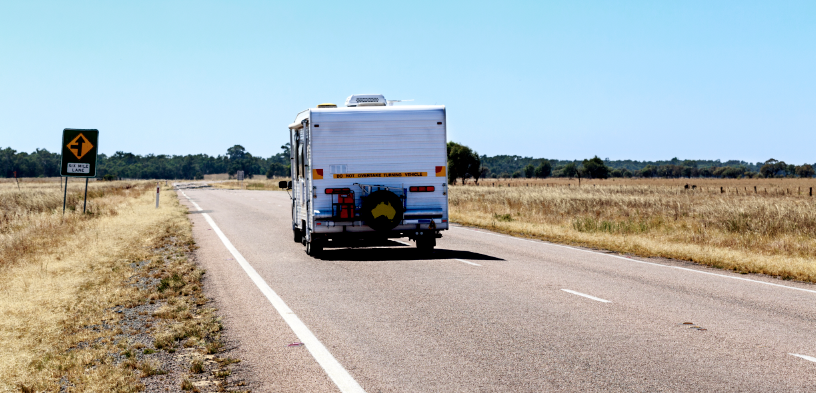In remote and rural Australia, so much of life is about choices and nothing clarifies priorities quite like a drought
Dear Julia,
It is that time of year again. The season of the great migration. Here in the outback we have wave upon wave of travelling retirees, intent on checking out their “own backyard”.
Grey Nomads have devolved to sit somewhere between the ovines and the bovines in the animal kingdom.
When in motion, they blunder about like old ewes, poking their noses through fences and randomly stopping, turning and starting. A new study has shown that cows sense the earth’s magnetic field and use it to line their bodies up north-south when grazing or resting. I’ve noticed Grey Nomads like to do the same thing with their four-wheel drives, caravans and motorhomes.
Some outback towns have capitalised on this behaviour and provide free overnight parking, in a strictly nose-to-tail/bonnet-to-bumper magnetic north-south formation.
The more entrepreneurial places also recognise that your average Grey Nomad likes to take pictures of big things. Any big thing will do, so long as it is a thing they recognise. “Abstract” sculptures fail to attract.
Put a gigantic statue of a piece of fruit, a person, an animal or a bogan in the main street; leave enough space for the amateur aged photographer to spread the legs slightly, lean back, throw the head up, extend both arms forward and snap and you have a sure-fire winner.
Add clean toilets, preferably with gender denoted along jocular rural lines – they use “Ewes” and “Rams” up this way – and you will have them blocking traffic in no time.
Thankfully by sundown, with the hunger for photos satiated and their bladders emptied in preparation for the night ahead, our snap-happy tourists will scuttle off to the sanctuary of their vans and allow life to return to normal for the locals.
Night falls rapidly and quietly. Apart from a few desperate souls having a slurry crack at karaoke in a scrofulous bar – in which, I have been (probably reliably) told, not to drink or touch any surface – there is no noise.
The farting burble of a V8 ute dropping down a cog before hanging a left out of town to join the highway and head back to the farm, serves to emphasise, not break the silence.
The local dogs don’t bark at strangers after dark. And the only voices to be heard are those in your own head. Which can be disturbing. I understand how a psychotic patient with too much internal discourse going on can find solace in listening to the conversation of his chooks.
The night-time calmness out here, so loved by the Grey Nomads, covers an underlying despair. The area is in the midst of drought and the locals are doing it tough. Nothing clarifies priorities quite like a drought.
The farmers are focused on one thing – what to feed hungry cattle when the hay, grass and grain runs out. Cotton seed, rice straw, nuts and grape seed will keep them going for a while, but will not produce an attractive product when the time comes to sell.
Thirty-five dollars a head is better than having to shoot them, but won’t leave much to fight over if a marriage goes belly up or the kids decide to dispute the will.
Those who don’t have much are forced to make rotten choices and their health often suffers as a result. A high blood sugar may have many explanations. “I just had a coffee …with four tablespoons of sugar”. Poor choice.
“I haven’t been taking my diabetes tablets doc. Can’t afford them. The wife died last year and I’m still paying off her funeral.” Unfair choice.
Can’t help but think of your younger brother with his new job in the city with that large family law firm. In his first case, the combatants are divvying up $20 million, and I bet they’ll go at it like seagulls after chips. Unreal choice.
Here, it’s another dry year, a big blue sky and a town on the western plains is surrounded by a limitless horizon. And a levee bank. Allegedly constructed to hold back floods, it now serves as a barrier to the drought.
A wall to stop the barrenness from creeping in, augmented by two licensed supermarkets with a large stock of wines and spirits alway “on special” and available for purchase as a temporary salve to despair.
Sales appear to be disturbingly healthy – but I am seeing things from a comfortable, abstemious (I am on call) point of view.
It is not all doom and gloom; there is “Hope”. I met her last week – a full of beans, 94 year old – and we got to chatting. Hope attributes her longevity to being raised on goat’s milk!
There used to be a lot of goats around town in the old days. Goats don’t mind harsh, dry conditions; they are not fussy eaters and will thrive on any plant or vegetable matter.
Goats are more highly evolved than sheep, cows and Grey Nomads. They are also agile and inventive – so much so that in one really dry year they took to licking the registration stickers off the windscreens of the cars.
Put your money on the goats and the local farmers when The Hunger Games come to town. Don’t be tempted to back the Grey Nomads at any price. Like the sheep and the cattle, they won’t survive the early rounds.
Never stand between a Grey Nomad and a photo opportunity.
Love, Dad
Dr Max Higgs is a former country GP, a current rural and remote locum and a collector of stories


